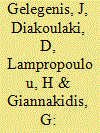| Srl | Item |
| 1 |
ID:
091701


|
|
|
|
|
| Publication |
2009.
|
| Summary/Abstract |
This paper aims at developing an integrated approach for estimating the employment benefits associated with power-generation technologies. The proposed approach exploits the input-output methodology for estimating the direct, indirect and induced employment effects associated with the energy project in question, as well as two different valuation techniques, namely the "opportunity cost of labour" approach and the "public expenditures" approach, for expressing these effects in monetary terms. This framework has been implemented to estimate the employment benefits resulting from the development of a lignite-fired and a natural gas-fired power plant in Greece, taking into account all the stages of the corresponding fuel cycles that are undertaken domestically. The results of the analysis clearly show that lignite-fired electricity generation results in significant employment benefits amounting to 2.9-3.5 €/MWh in the basic scenario. On the other hand, the employment benefits associated with the examined natural gas unit were estimated at 0.4-0.6 €/MWh in the basic scenario. It is also worth mentioning that the significant environmental externalities of the lignite-fired electricity in Greece that have been presented in a number of studies can only be partially compensated by the estimated employment benefits.
|
|
|
|
|
|
|
|
|
|
|
|
|
|
|
|
| 2 |
ID:
128337


|
|
|
|
|
| Publication |
2014.
|
| Summary/Abstract |
The building sector in Greece presents a huge energy saving potential, the largest part of which is remaining unexploited. The recently enacted legislation for the energy performance of buildings, in combination with the financial support provided by funding programmes to low income families is expected to significantly boost the deployment of energy efficient technologies in the Greek domestic sector. The exploitation of these legal and financial instruments follows a formalised process of energy audits, resulting in buildings classification and in the submission of Energy Performance Certificates (EPCs) including suggestions to improve the dwellings' energy performance. The paper aims at an ex-ante evaluation of the market trends revealed by EPCs in Greece, in order to identify the perspectives of individual technologies and to assess the degree to which the certification procedure helps in improving the energy performance of buildings. The results indicate a strong trend towards less cost-effective technologies, revealing a sub-optimal allocation of financial resources and putting into risk the path towards the achievement of EU targets for 2020.
|
|
|
|
|
|
|
|
|
|
|
|
|
|
|
|